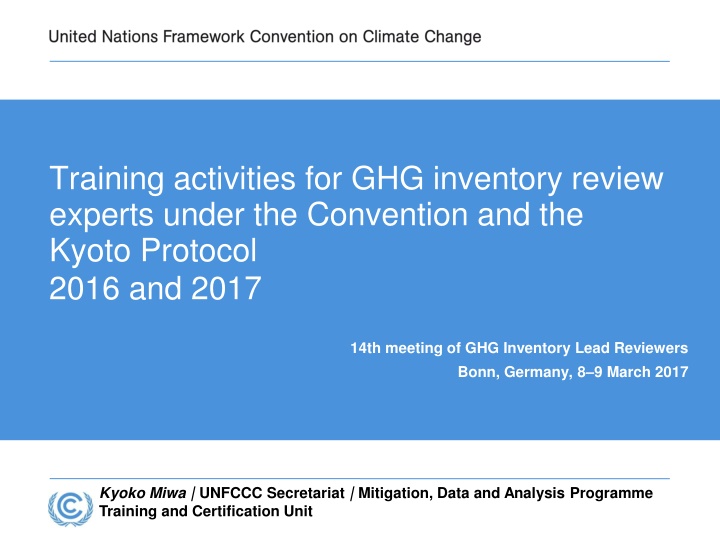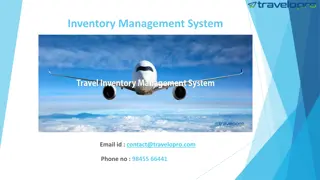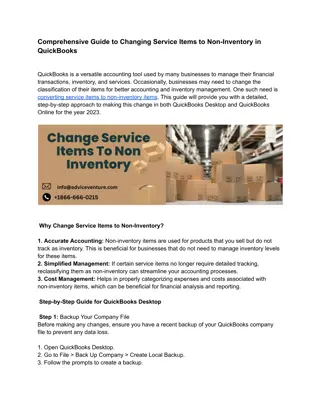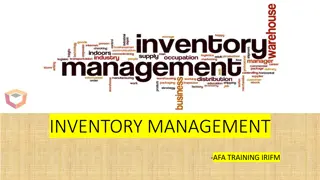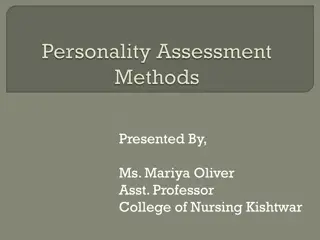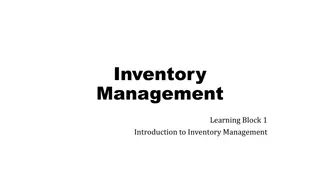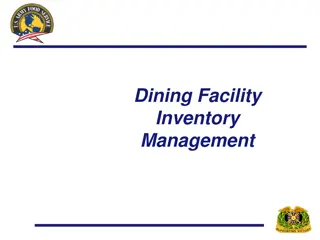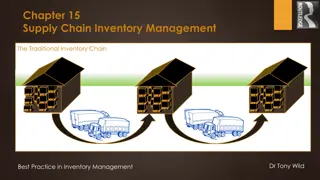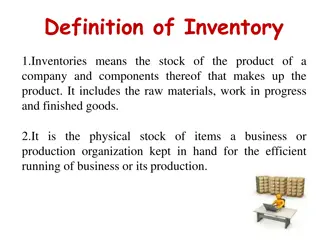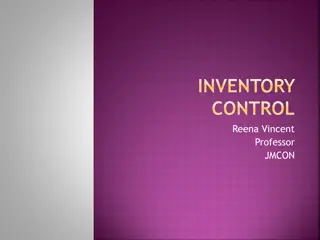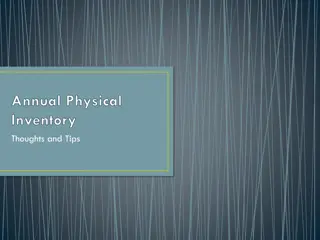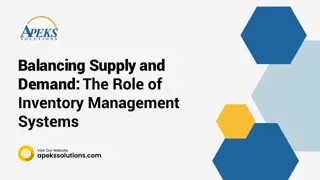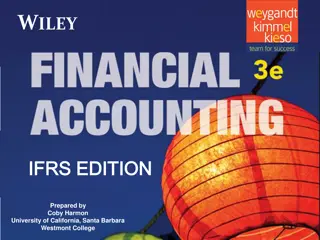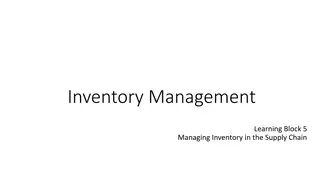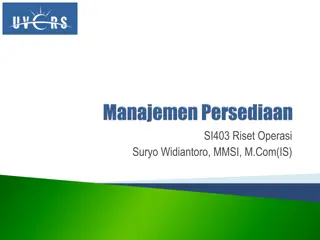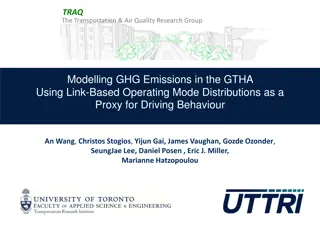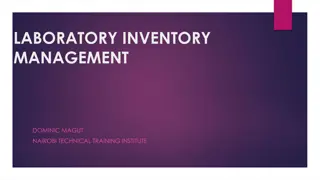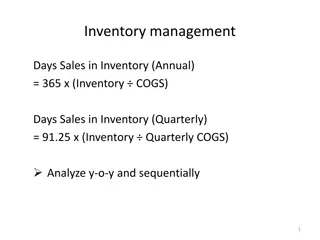GHG Inventory Review Training Activities 2016-2017
Training activities for GHG inventory review experts under the Convention and the Kyoto Protocol conducted in 2016 and 2017, including basic courses, exams for new experts, refresher seminars, and updates on KP courses. The activities aimed to enhance expertise in reviewing greenhouse gas inventories.
Download Presentation

Please find below an Image/Link to download the presentation.
The content on the website is provided AS IS for your information and personal use only. It may not be sold, licensed, or shared on other websites without obtaining consent from the author.If you encounter any issues during the download, it is possible that the publisher has removed the file from their server.
You are allowed to download the files provided on this website for personal or commercial use, subject to the condition that they are used lawfully. All files are the property of their respective owners.
The content on the website is provided AS IS for your information and personal use only. It may not be sold, licensed, or shared on other websites without obtaining consent from the author.
E N D
Presentation Transcript
Training activities for GHG inventory review experts under the Convention and the Kyoto Protocol 2016 and 2017 14th meeting of GHG Inventory Lead Reviewers Bonn, Germany, 8 9 March 2017 Kyoko Miwa | UNFCCC Secretariat | Mitigation, Data and Analysis Programme Training and Certification Unit
Activities in 2016 Basic course (14/CP.20) Basic course for new experts One instructed on-line course + Training Seminar (in Bonn, April 2016) 30 experts participated. 12 experts passed the sectoral exams, also passed Overview . 6 experts passed Overview only. Non-instructed course For new experts, who have technical background. Requirement to be a reviewer: pass Overview + one of the sectoral course written exams, in person. In 2016, 20 new experts in total passed the Basic course participants AI 11 AI 19 Both exams Passed Pass rate in % AI NAI 7 5 AI NAI 8 0 Only Overview passed AI 1 AI 3 Instructed NAI 19 NAI 0 AI NAI NAI 5 NAI NO Seminar in Bonn Non-instructed New experts 63.4% 26.3 % AI 42% NAI NO
Activities in 2016 Basic courses (14/CP.20) Findings from exam results of new experts in the non-instructed courses Participation organised by the national inventory team good in exams. Clear difference in their answers to the exam questions between: o o Expert studied on-line course Expert didn t spend much time for the on-line courses VS Demonstrate solid understanding of the issues, both cross-cutting and sectoral Answered based on their knowledge acquired learning by doing. Misunderstanding, in particular for cross-cutting issues, Knowledge of the good practice requirements in the sector is not balanced. Highly encourage to ensure participants study the course and take both exams, Overview and sectoral o 3
Activities in 2016 Basic courses (14/CP.20) Non-instructed course for experienced experts 356 reviewers and LRs invited in 2015-2016 288 registered courses 56 Experts took exams, 20.8% 2, 24.4% 1, 75.6% 213 experts did not take exams, 79.2% In total, 34 experts passed exams in non-instructed courses 8 new experts passed 26 experienced 2 7.3% of reviewers and LRs completed the new courses to date Exams offered for in person at LR13, SB44, SB 45, reviews, and other opportunities.
Activities in 2016 Basic courses Refresher seminar - 29 February, back to back LR 13 meeting Focus on the experience gained from the reviews during the 2015 review cycle Participated 55 experts. Centralized review experience: General perspective, presented by Olia and sectoral perspective by Anna (LRs). Desk review experience presented by Riitta (LR).
Activities in 2016: Update of KP courses (5/CMP.11) Launched on 11 July, in time for the 1st cycle of the review under KP CP2 Drafted by 4 experienced experts including LRs, supported by ROs. All KP courses were updated reflecting changes arising from relevant CMP decisions for the review processes for the KP CP2: 2/CMP.7, 3/CMP.7, 4/CMP.7, 1/CMP.8, 6/CMP.9, 2/CMP.11, 3/CMP.11, 4/CMP.11, to reflect: o KP-LULUCF accounting rules for CP2, FMRL, HWP, etc.; o requirement for AI Parties without quantified emission limitation and reduction commitment; o updates for adjustments process; o updated guidance on national systems, assigned amounts and national registries Website and course pages were developed and being hosted in- house. Implemented through the secretariat s Learning Management System (LMS) More frequent minor revisions may be possible More work for the technical assistance by the secretariat More control for implementation 6
Activities in 2016: Update of KP courses (5/CMP.11) Updated KP courses Overview Two cycles: non-instructed and instructed - for article 3.3 and 3.4 course 11 July 14 August 2016, and exams on 15-17 August 2016, 6 15 September 2016, and exams on 16 -18 September. New experts who passed for KP review: 12 (10 more are waiting for the exams) 327 experts were invited 149 exams were not taken 42% Total courses registered: 359 210 exams were taken (58%) 89 experts registered to one or more courses 66 experts took exam (around 20% of invited experts) 63 experts passed at least one exam Experienced experts are strongly recommended to study the course Guidance such as step by step guidance for the adjustment is very helpful to ensure a consistent review approach amongst the ERTs
Activities in 2016: Update of KP courses (5/CMP.11) Findings from the implementation of the courses in 2016 Took exams 52 34 17 52 28 27 % of pass 88.5% 88.2% 82.4% 82.7% 57.1% 74.1% Passed Av score 91.4 79.7 76.5 80 73.75 75.05 Failed Av score 53.3 48.3 59.7 56.2 49.8 46.3 Registered Passed National Systems Adjustment non-LULUCF Adjustment LULUCF&LR Assigned Amount National Registry Art. 3.3 & 3.4 activities 73 43 29 104 56 54 46 30 14 43 16 20 Pass rates and average scores of experienced experts are high. During the review, many experts referred the guidance in the training courses Take the opportunity to update your knowledge!! Less than 20% reviewers passed the courses Almost all experts registered 4 or 5 courses, but many overdue. Plan your study!! 8
Activities in 2016: Update of KP courses (5/CMP.11) Mandatory requirements for the experienced reviewers Reviewers New expert New Non- LULUCF expert Expert Courses LULUCF expert LULUCF expert New LR reviewer to the subject Generalist National systems Application of adjustments Accounting of assigned amounts National registries and assigned amounts Articles 3.3 and 3.4 review Mandatory requirement of experienced reviewers needs to be fulfilled 20 experts passed Art. 3.3&3.4, so far. Be aware the mandatory requirements of new LRs and LULUCF reviewers!!
Related activities in 2016 Implementation of CGE TTE training programme Training programme for members of team of technical experts to participate in the technical analysis of BURs 2 rounds in 2016. (2 rounds are planned in 2017) Support to implement new Roster of Experts (ROE) Substantial/technical support for the development of the new ROE platform ROE: web-based interface that experts can directly log-in. Experts self-nomination NFPs approval Experts self-updating data NFPs approval (when needed) 10
Planned activities in 2017 Basic course for inventory reviews under the Convention 1st round for new experts: focusing on African region On-line training (instructed): 6 February 20 March, 35 experts Training seminar: 21-23 March in Victoria Falls, Zimbabwe 32 experts. 2ndround for new experts (2ndhalf of 2017, Bonn) depending on the availability of resources Non-instructed for experienced review experts: 1stRound: February-March, to have exams back to back with LR14 Exams are in person: LRs meeting, SBs, COP23, and other opportunities Higher tier methods and improving communication courses: upon request, around the year. Updated Kyoto Protocol courses 1st round on-line course and exams: 1st half of 2017 Refresher Seminar on 8 March Experiences from desk reviews and in-country reviews Operationalizing reviews: drafting findings and recommendations, RITS and review reports Reviewing KP LULUCF in the second commitment period 11
Suggested elements for conclusions Note the timely launch of revised KP courses; Acknowledge positive feedback to the training programmes and materials from the Parties and experts; Note the need for more time and experience to consider the effectiveness of the training materials for further enhancement and development of training materials; Reiterate strong encouragement /recommend that experienced review experts and LRs undertake the relevant courses and examinations of the GHG inventory review training programme and the KP training courses; Nominating new experts to the RoE and updating the information of experts is very important. Note the limited human and financial resources in the secretariat for undertaking further enhancements.
Thank you very much. MDA-training@unfccc.int http://unfccc.int/national_reports/expert_training/items/9251.php 13
